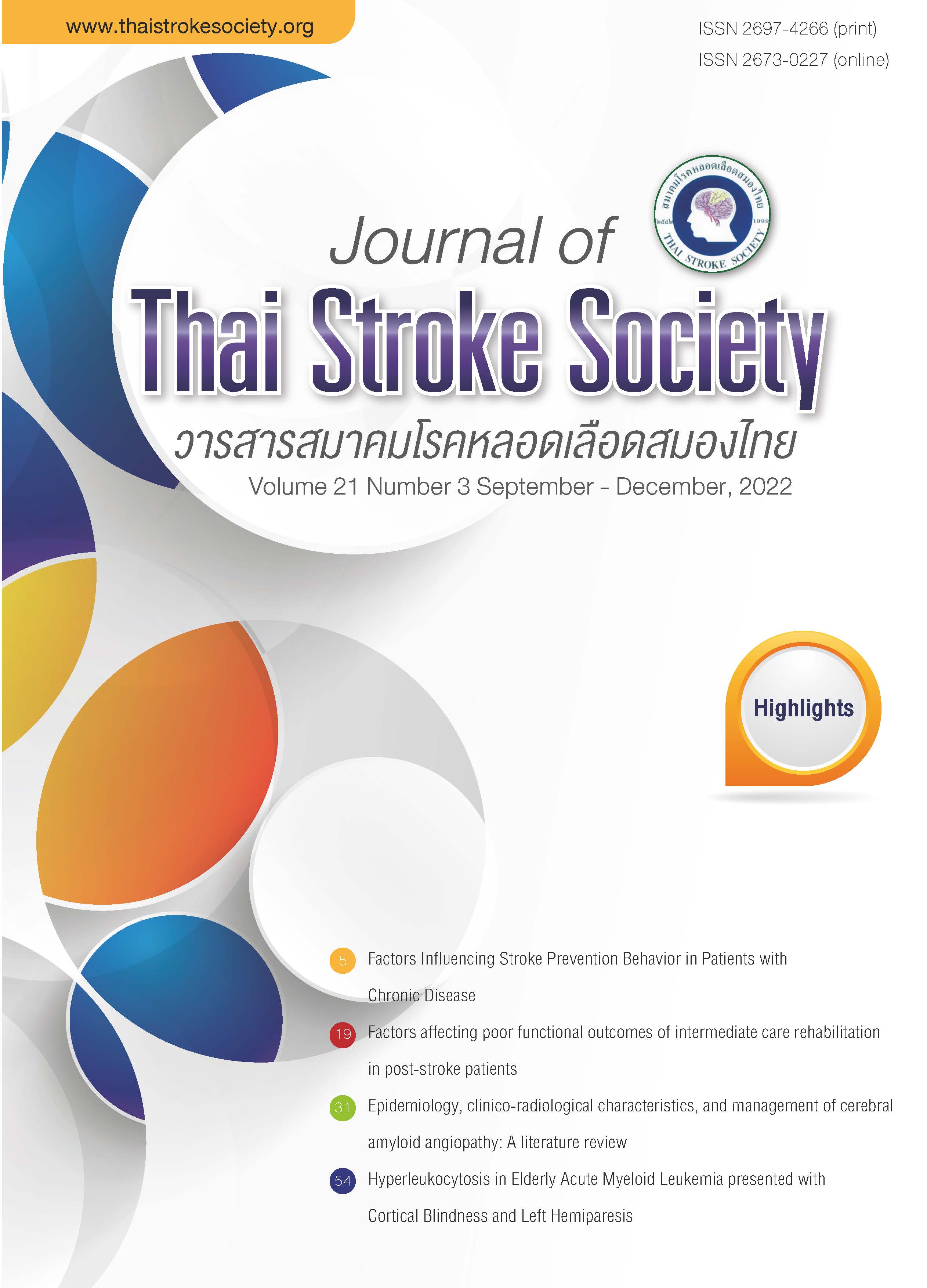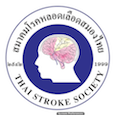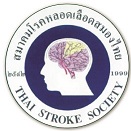Factors affecting poor functional outcomes of intermediate care rehabilitation in post-stroke patients
Keywords:
Intermediate care, functional outcome, strokeAbstract
Objective: This study aims to evaluate factors affecting poor functional outcomes of stroke patients who participated in intermediate care (IMC) rehabilitation services.
Method: This study was a retrospective study in acute stroke patients who participated in IMC rehabilitation services in Chumphon province. The data were collected from medical records. The functional outcomes were recorded at baseline and 6-month follow-up by using Barthel index (BI). Patients were divided into good (ΔBI ≥ 2) and poor (ΔBI < 2) functional outcomes groups. The predictors of poor functional outcomes were determined with multiple logistic regression analyses.
Result: 124 patients were recruited, of which 35 (28.2%) were in the poor functional outcome group, 9.7% died during 6 months follow-up. The final model of analysis, with multiple logistic regression, demonstrated that the factors affecting poor functional outcomes were age ≥ 65 years old (ORadj=11.2; p-value=0.004), being dependent in ambulation before stroke (ORadj=13.1; p-value=0.007), high NIHSS score at admission (ORadj=1.1; p-value=0.008), impaired sitting balance (ORadj=6.8; p-value=0.008) and poor motivation for rehabilitation programs (ORadj=13.2; p-value=<0.001).
Conclusion: Poor functional outcomes of stroke patients who participated in intermediate care rehabilitation services were found to be associated with age, ambulation status before stroke, NIHSS score at admission, sitting balance and motivation for rehabilitation programs.
References
Lawrence ES, Coshall C, Dundas R, Stewart J, Rudd AG, Howard R, et al. Estimates of the prevalence of acute stroke impairments and disability in a multiethnic population. Stroke. 2001;32:1279-84.
Muntner P, Garrett E, Klag MJ, Coresh J. Trends in stroke prevalence between 1973 and 1991 in the us population 25 to 74 years of age. Stroke. 2002;33:1209-13.
The Ministry of Public Health. Guideline for Intermediate Care (service plan) [Internet]. 2019. [Cited 2019 Jan 1]. Available from: http://www.snmri.go.th/wp-content/uploads/2021/01/10-Guideline-for-Intermediate-Care.pdf.
Cifu DX, Stewart DG. Factors affecting functional outcome after stroke: a critical review of rehabilitation interventions. Archphys med rehabil. 1999;80:35-9.
Meyer MJ, Pereira S, McClure A, Teasell R, Thind A, Koval J, et al. A systematic review of studies reporting multivariable models to predict functional outcomes after post-stroke inpatient rehabilitation. Disabil Rehabil. 2015;37(15):1316-1323.
Suksathien R, Sukpongthai T. Predictors of Long-term Functional Outcomes in Acute Stroke Patients. J Thai Rehabil Med. 2017;27(3):96-100.
Kongsawasdi S, Klaphajone J, Watcharasaksilp K, Wivatvongvana P. Prognostic factors of functional outcome in ischemic stroke during 6 months after onset. J Clin Med Res. 2019;11(5):375-382.
Dajpratham P, Meenaphant R, Junthon P, Pianmanakij S, Jantharakasamjit S, Yuwan A. The inter-rater reliability of Barthel Index (Thai version) in stroke patients. J Thai Rehabil Med. 2006; 16:1-9.
Y.-W. Hsieh, C.-H. Wang, S.-C. Wu, P.-C. Chen, C.-F. Sheu, and C.-L. Hsieh. Establishing the minimal clinically important difference of the Barthel Index in stroke patients. Neurorehabilitation and Neural Repair. 2007;21(3):233–38.
Kwansanit T. Outcomes of Sub-acute rehabilitation program in stroke patient, Suratthani hospital. Region 11 medical journal. 2017;31(4):723-732.
Suksathien R. Accessibility to medical rehabilitation service for acute stroke at Maharat Nakhon Ratchasima Hospital: Related factors and outcomes. J Thai Rehabil Med. 2014;24:37-43.
Wang YH, Yang YR, Pan PJ, Wang RY. Modeling factors predictive of functional improvement --following acute stroke. J chin med assoc. 2014;77:469-76.
Sien Y, Astrid S, Silva D, Tan M, Tan Y, Chew E. Functional outcomes after inpatient rehabilitation in a prospective stroke cohort. Singapore Healthcare. 2013;22:175-82.
Jørgensen HS, Nakayama H, Raaschou HO, Olsen TS. Stroke. Neurologic and functional recovery the Copenhagen Stroke Study. Phys Med Rehabi Clin N Am 1999;10(4):887-906.
Oh HM, Im S, Ko YA, Ko SB, Park GY. The sitting-unsupported balance score as an early predictor of functional prognosis in stroke patients: a pilot study. Ann Rehabil Med. 2013;37(2):241-246.
Kim TJ, Seo KM, Kim DK, Kang SH. The relationship between initial trunk performances and functional prognosis in patients with stroke. Ann Rehabil Med. 2015;39(1):66-73.
Rønning OM, Guldvog B. Outcome of subacute stroke rehabilitation: a randomized controlled trial. Stroke. 1998;29:779-84.6.
Ozdemir F, Birtane M, Tabatabaei R, Kokino S, Ekuklu G. Comparing stroke rehabilitation outcomes between acute inpatient and non intense home settings. Arch Phys Med Rehabil.2001;82:1375-9.
Pattanasuwanna P. Outcomes of intermediate phase post-stroke inpatient rehabilitation in community hospital. J Rehabil Med. 2019;29:8-13.
Kuptnirasaikul V, Wattanapan P, Wathanadilokul U, Sukonthamarn K, Lukkanapichonchut P, Ingkasuthi K, et al. The effectiveness and efficiency of inpatient rehabilitation services in Thailand: a prospective multicenter study. Rehabil Process Outcome. 2016;5:13-8.
Kuptnirasaikul V, Kovindha A, Dajpratham P, Piravej K. Main outcomes of stroke rehabilitation: A multicenter study in Thailand. J Rehabil Med. 2009;41:54-8.
Korjedee P, Wongtao C, Maungthaitut P. The effect of Thai massage on activities of daily living, anxiety and depress in stroke patients. Journal of Nursing Science & Health. 2019;42(2):106-114.
Downloads
Published
How to Cite
Issue
Section
License
Copyright (c) 2022 Journal of Thai Stroke Society

This work is licensed under a Creative Commons Attribution-NonCommercial-NoDerivatives 4.0 International License.
ข้อความภายในบทความที่ตีพิมพ์ในวารสารสมาคมโรคหลอดเลือดสมองไทยเล่มนี้ ตลอดจนความรับผิดชอบด้านเนื้อหาและการตรวจร่างบทความเป็นของผู้นิพนธ์ ไม่เกี่ยวข้องกับกองบรรณาธิการแต่อย่างใด การนำเนื้อหา ข้อความหรือข้อคิดเห็นของบทความไปเผยแพร่ ต้องได้รับอนุญาตจากกองบรรณาธิการอย่างเป็นลายลักษณ์อักษร ผลงานที่ได้รับการตีพิมพ์ในวารสารเล่มนี้ถือเป็นลิขสิทธิ์ของวารสาร





